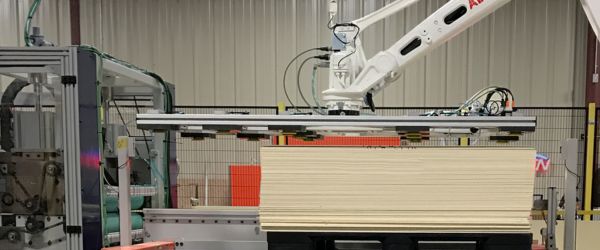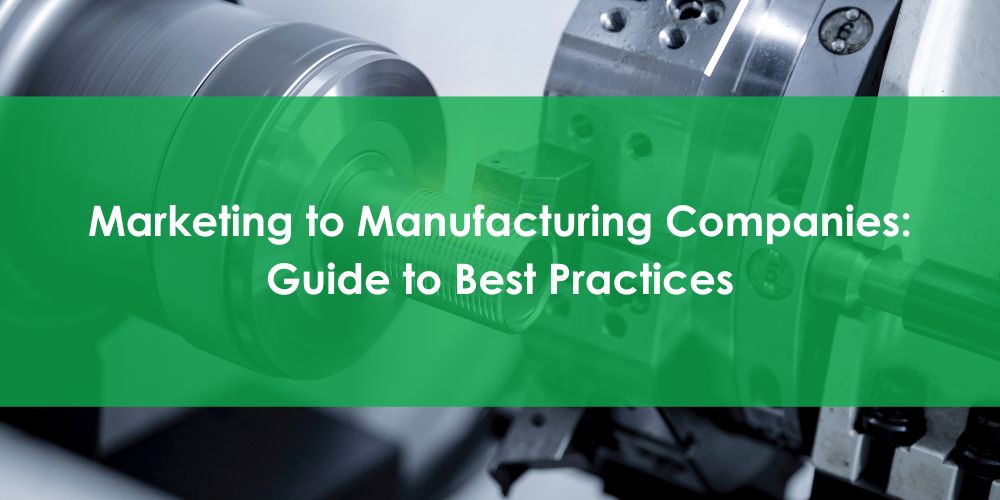Revolutionizing Your Business: The Ultimate Guide to Marketing for Manufacturers
Welcome to the world of manufacturing marketing, where complexities rule the roost and innovation is at the heart of every operation. Amidst this dynamic environment, one aspect that often gets overlooked but holds paramount importance is marketing for manufacturers. In an industry known more for its machines than its messaging, marketing can often be the underutilized tool that could propel your manufacturing business to new heights.
In today’s increasingly digital economy, marketing is not just about promoting your products or services. It’s about communicating your value proposition, establishing relationships, and positioning your manufacturing firm as an industry leader. This guide will walk you through the essentials of marketing for manufacturers, helping you navigate the marketing landscape and implement strategies that will revolutionize your business.
I. The Relevance of Marketing for Manufacturing
Gone are the days when a quality product was enough to attract and retain customers. In today’s highly competitive manufacturing landscape, marketing is what differentiates a thriving business from one that’s barely keeping afloat. Marketing, in essence, is the bridge that connects your manufacturing business with potential customers. It’s the vehicle that communicates your value proposition, showcases your unique selling points, and positions your brand in the marketplace.
Marketing is also instrumental in generating leads and driving sales. A robust marketing strategy allows manufacturers to reach potential customers, understand their needs, and provide solutions that meet those needs. By doing so, you not only attract new customers but also foster loyalty among existing ones, thus ensuring a steady flow of business.
II. Emphasizing Content Marketing for Manufacturers for Improved SEO Results
Content marketing is a powerful tool that not only helps in creating a brand narrative but also plays a critical role in improving your online visibility through Search Engine Optimization (SEO). It involves creating and sharing valuable content to attract, engage, and convert your target audience. For manufacturers, content marketing offers a unique opportunity to demonstrate industry expertise, share insights, and connect with customers on a deeper level.
A comprehensive content marketing strategy is crucial in today’s digital age. Quality content in the form of blog posts, white papers, case studies, or webinars can drive traffic to your website, generate leads, and build brand authority.
Picking the right keywords is a fundamental aspect of content marketing and SEO. Keywords are the phrases or terms that potential customers type into search engines when looking for products or services like yours. By incorporating these keywords into your content, you can improve your website’s visibility on search engines and attract more relevant traffic.
Start by conducting keyword research to identify the terms that are relevant to your manufacturing business and have a high search volume. Once you have a list of keywords, incorporate them strategically into your content, titles, meta descriptions, and URLs. Remember, the goal is not to stuff your content with keywords but to use them naturally and contextually.
The rise of video content is another trend that manufacturers should capitalize on. Videos are a powerful tool for demonstrating complex manufacturing processes, showcasing products, and telling your brand story. They are engaging, shareable, and can significantly boost your online visibility.
Moreover, Google and other search engines favor content that provides value to users, and videos often meet this criterion. So, consider creating instructional videos, product demonstrations, or customer testimonials to enhance your content marketing efforts and improve your SEO results.
Lastly, ensure that all your content is optimized for SEO. This means using relevant keywords, creating engaging meta descriptions, using alt tags for images, and incorporating internal and external links.
Content marketing is not just about producing content; it’s about creating valuable, SEO-friendly content that resonates with your audience and improves your online visibility. By doing so, you can position your manufacturing business as an industry leader and attract more potential customers.
III. Automating Marketing Efforts
Marketing automation is no longer a luxury—it’s a necessity. With the myriad tasks involved in a marketing campaign, automation can streamline processes, enhance efficiency, and ultimately, improve results.
From scheduling social media posts to triggering email campaigns based on user behavior, automation can save time and resources. It also provides valuable insights into campaign performance, enabling you to tweak and optimize your strategy for better outcomes.
IV. The Power of Email for Marketing for Manufacturers
Despite the proliferation of new digital marketing channels, email marketing remains one of the most effective strategies for nurturing leads and driving conversions. It allows manufacturers to establish direct communication with potential customers, share valuable content, and promote products or services.
The key to successful email marketing for manufacturers lies in personalization and value addition. Customize your emails based on the recipient’s needs and interests, offer valuable information, and keep promotional content to a minimum. Also, consider segmenting your email list to deliver more targeted and relevant content.
V. Harnessing the Power of Google PPC for Lead Generation
Pay-per-click (PPC) advertising, particularly on Google, has emerged as a potent tool for manufacturers to generate qualified leads, boost conversions, and improve return on investment (ROI). By leveraging Google PPC, you can display your advertisements to potential customers who are actively searching for your products or services.
PPC is based on an auction system, where you bid on keywords related to your manufacturing business. When users search for these keywords, your ad can appear above or alongside organic search results, providing significant visibility. The key advantage of PPC is that you only pay when someone clicks on your ad, making it a cost-effective strategy for driving targeted traffic to your website.
Here are some best practices for optimizing your Google PPC campaigns:
- Keyword Research: Just like in SEO, keyword research is crucial in PPC. Identify keywords that potential customers are likely to use when searching for your products or services. Consider long-tail keywords, which are more specific and less competitive.
- Ad Copy: Create compelling ad copy that clearly communicates your value proposition. Highlight unique selling points, offers, or promotions that make your product or service stand out.
- Landing Page Optimization: A user who clicks on your ad is directed to a landing page. This page should be relevant to the ad and offer a seamless user experience. Make sure it’s easy to navigate, offers valuable information, and includes a clear call-to-action.
- Tracking and Optimization: Monitor your PPC campaign performance regularly. Use Google Analytics to track clicks, conversions, and bounce rates. Based on the insights, tweak your campaign for improved outcomes.
The benefits of Google PPC for manufacturers are immense. It offers immediate visibility on the world’s most popular search engine, drives targeted traffic, and delivers measurable results. Whether you’re looking to generate leads, increase sales, or boost brand awareness, Google PPC can be a game-changer for your manufacturing business.
VI. Setting KPIs, Tracking Results, and Embracing Continuous Iteration
In any marketing strategy, the importance of setting Key Performance Indicators (KPIs), tracking results, and iterating for improvement cannot be overstated. These steps are crucial for assessing the effectiveness of your marketing efforts and identifying areas for enhancement.
- Setting KPIs: KPIs are measurable values that demonstrate how effectively your manufacturing business is achieving key objectives. They can range from website traffic and lead conversion rates to email open rates and PPC click-through rates. It’s crucial to set KPIs that align with your business goals and provide insights into your marketing performance.
- Tracking Results: Once you have your KPIs in place, the next step is to track them regularly. Tools like Google Analytics, HubSpot, and MailChimp provide detailed analytics that can help you monitor your marketing performance. By tracking your KPIs, you can gauge what’s working, what’s not, and where you need to focus your efforts.
- Embracing Continuous Iteration: The digital marketing landscape is dynamic and constantly evolving. As such, your marketing strategy should be flexible and adaptable. This is where the PDCA (Plan-Do-Check-Act) cycle comes into play.
The PDCA cycle is a continuous loop of planning, doing, checking, and acting. It is an effective approach for driving continuous improvement in your marketing strategy. Here’s how it works:
- Plan: Identify your marketing objectives and formulate a strategy to achieve them. This includes setting KPIs, choosing marketing channels, and planning campaigns.
- Do: Implement your marketing strategy. This could involve launching PPC campaigns, publishing blog posts, sending email newsletters, or hosting virtual events.
- Check: Monitor your KPIs and analyze the results of your marketing efforts. Are you meeting your objectives? If not, what are the potential issues?
- Act: Based on your analysis, make necessary adjustments to your marketing strategy. This might involve tweaking your PPC ad copy, optimizing your email subject lines, or improving your content marketing strategy.
Remember, marketing for manufacturers is not a one-and-done task. It’s a process that requires continuous monitoring, analysis, and improvement. By setting KPIs, tracking results, and embracing the PDCA cycle, you can ensure your marketing strategy remains effective and continues to drive results for your manufacturing business.
VII. Conclusion
Marketing in manufacturing is not just about selling products or services; it’s about establishing your brand, connecting with your audience, and delivering value. By adopting a comprehensive marketing strategy that leverages content marketing, automation, email marketing, and events, you can revolutionize your business and stay competitive in the dynamic manufacturing landscape.
If you’re ready to take your manufacturing business to the next level, we at ZAG FIRST B2B Marketing are here to help. With our expertise in marketing for manufacturers, we can provide tailored marketing solutions that align with your business objectives and drive tangible results. Get in touch with us today to explore how we can transform your marketing efforts and fuel your business growth.
Remember, in the world of manufacturing, marketing is the secret ingredient that can set your business apart. Embrace it, and watch your business soar to new heights.
Marketing for manufacturers may seem like a daunting task, but with the right strategies and partners, it can be a game-changer for your business. Take the first step towards revolutionizing your business. Contact us today and let’s get started on creating a marketing strategy that delivers results.





